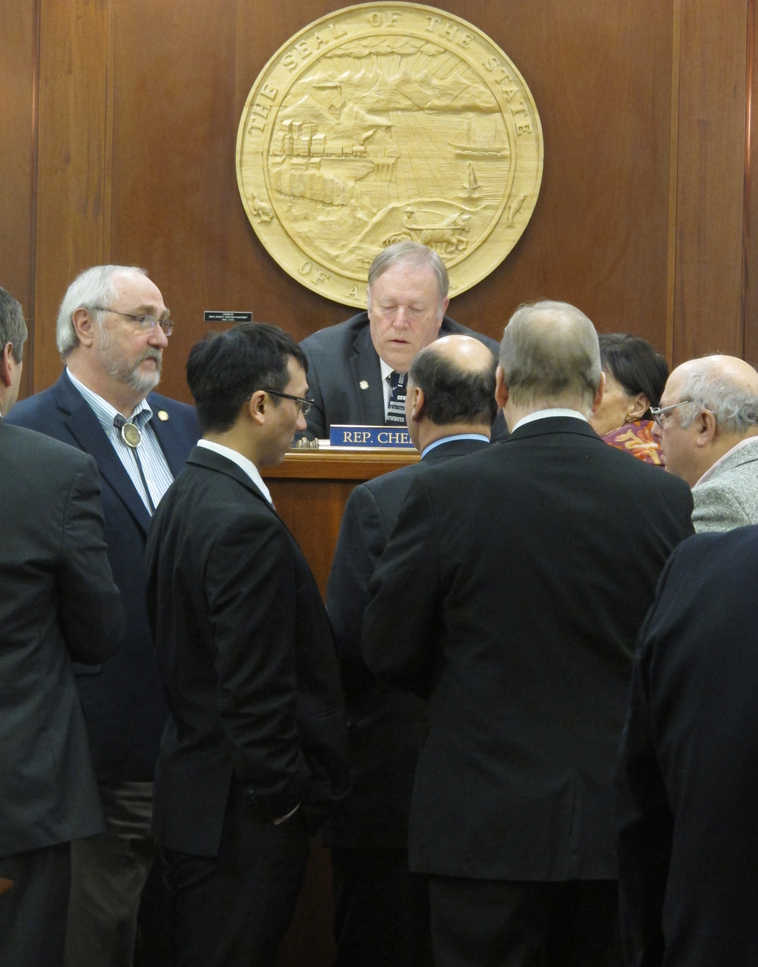JUNEAU — Efforts to reach an agreement on a state spending plan continued Monday as the Legislature went into overtime.
But even after a budget is finalized, legislators’ work might not be done. Gov. Bill Walker has indicated he could call a special session if lawmakers don’t address Medicaid expansion before adjourning.
If a special session is convened, bills under consideration would be limited to those listed by Walker. Under the current extended session, all bills remain in play.
Lawmakers failed to reach a budget deal before the scheduled end of the session Sunday, with education funding a sticking point.
House Minority Leader Chris Tuck said his Democratic-led caucus wants to restore $32 million in one-time funds that were approved last session for schools then cut from the proposed capital spending package, a move first proposed by Walker.
The caucus also wants to reverse a $47.5 million Senate-proposed cut to school funding for next year and favors inflation-proofing for the school funding formula, he said.
Asked if there was wiggle room, he said it depended on the entire package. He said his members also want to fund negotiated pay increases in labor contracts for next year; provide sufficient funding for a “functional” state ferry system and expand Medicaid.
“We put a package together that is non-controversial with the public,” Tuck, D-Anchorage, said Monday.
Senate President Kevin Meyer, R-Anchorage, said that given Alaska’s fiscal situation, the education package put together last session was no longer realistic. He said the state cannot keep increasing education funding like it used to.
The Senate majority took heat for the cuts it proposed, including to the ferry system and pay increases, he said.
“So my guys are saying, We did what we were supposed to do, we did what the people told us to do when we came down here, and we took a hit for it so we don’t want to see it all be given back just because the House Democrats want more,” he said.
Meyer noted, though, there is some give and take in negotiations.
Negotiations are occurring not only between the House and Senate but also between the House majority and minority. It has been expected that a three-fourths vote would be called for to authorize a draw from the constitutional budget reserve to help cover costs of state government. In the House, Democratic support would be needed to meet that threshold.
Tuck said House Speaker Mike Chenault, R-Nikiski, was working well with the minority.
While talks were underway, so was the packing. Many legislators have vehicles scheduled on a ferry Tuesday, and vans that will transport computer equipment bound for communities such as Anchorage and Fairbanks are scheduled to arrive beginning Wednesday, said Pam Varni, executive director of the Legislative Affairs Agency. Computers in certain offices could remain if the session runs long or there is a special session.
Walker said having legislators stay in Juneau for a possible special session rather than convene in another location is a fiscal issue for him. But he said he would discuss that with legislative leadership.
Senate Majority Leader John Coghill, R-North Pole, said he thinks Walker could get “another handful of people supporting him” on Medicaid expansion if he waits until fall to hold a special session on that issue. Coghill said that would allow time to make sure, among other things, that a Medicaid payment system is working.
If lawmakers wind up approving Medicaid reforms but not expansion, Walker said he would have to see what any proposed Medicaid reforms looked like before deciding whether he might take any action on his own toward accepting expansion. Unilateral action would be his last preference, he said.
Supporters of Medicaid expansion see it as a way to leverage federal resources to help finance reform efforts. Walker said reform without expansion is only half the process.
Voters in 2006 approved an initiative calling for 90-day legislative sessions, but the Alaska Constitution allows legislators to meet for up to 121 days, with an option of extending.
The Alaska House took up amendments to the state capital budget but held off a vote late Monday.
The capital budget is typically one of the last items in play during the legislative session. It was pushed to Tuesday’s calendar. Talks were under way on the operating budget, another piece of the state’s overall spending package.
The Democratic-led minority, among other things, sought to restore $52 million in one-time funds for schools between 2016 and 2017. That money was approved last session but the governor and lawmakers proposed cutting it as the state grapples with a multibillion-dollar budget deficit.
Education funding has been a sticking point in budget negotiations as the lawmakers try to wrap up the legislative session, which had been scheduled to end Sunday.

